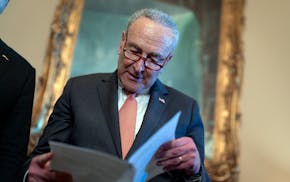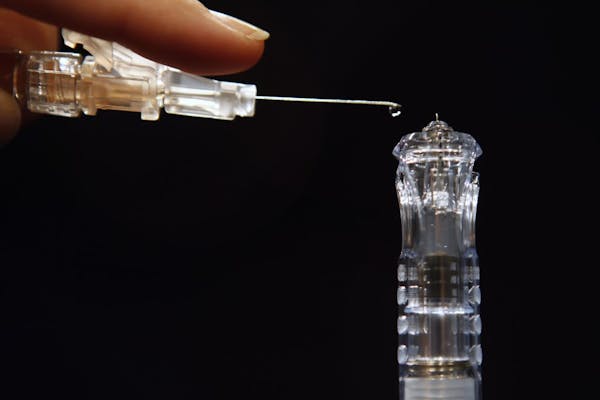It's been a dozen years since the nation's first retail-based medical clinic opened at a Cub Foods supermarket in St. Louis Park, a radical concept that caused a fuss among some doctors but received the immediate embrace of busy moms, ailing workers and the uninsured.
Such walk-in clinics stand to gain a lot more customers in the years ahead. More than 30 million Americans will gain health insurance in 2014 as a result of federal health reform efforts, at a time when many doctors' offices already are full and a physician shortage looms.
MinuteClinic, Target and other walk-in retail clinics are expanding services and gearing up for growth, betting that the convenience and low prices they offer will attract new patients beyond the busy peaks of cold and flu season.
"Increasingly, patients don't have easy and convenient access to care," MinuteClinic President Dr. Andrew Sussman said. "As we look ahead to a world of providing more preventive care and monitoring for chronic diseases, we believe we can play an important, supportive role as part of a larger team of providers taking care of the patient."
Staffed by nurse practitioners or physician assistants, the walk-in clinics offer vaccinations, basic lab work and treatment for minor ailments without an appointment. Visits cost about half as much as a typical trip to the doctor, and about two-thirds less than going to the emergency room for the same condition. Most insurance plans are accepted.
CVS Caremark's MinuteClinic, the nation's first and largest retail clinic chain, now monitors chronic conditions such as diabetes and high cholesterol and screens for asthma. Patients can get flu and tetanus shots as well as a growing list of other vaccinations.
This summer, Minneapolis-based Target Corp. became one of the few retail operators to offer cosmetic services. Shoppers can get a $49 consultation for eyelash lengthening, facial hair removal and treatment of hyperpigmentation - and, of course, head to the pharmacy and fill the prescription.
"It's a logical extension of the services we already provide in clinics," said Dr. Kevin Ronneberg, TargetClinic's medical director, noting that the clinics already treat acne and other skin conditions.
Large hospital systems are starting to align with the clinics in more meaningful ways, pushed in part by the federal law that will penalize hospitals that have too many readmissions.
MinuteClinic has forged alliances with 20 prominent medical systems around the country including Minneapolis-based Allina Health.
"If health care's payment model is going to change, and we're going to be responsible for taking care of populations, then you have to start to fill in the holes of where people access care," said Dr. Bob Wieland, Allina's vice president of ambulatory services. "We have urgent cares and we have clinics. We didn't have retail clinics -- a cost-effective, good-value model for certain illnesses."
The partnerships allow retail clinic staff and doctors to share electronic health data and better coordinate care, Wieland said. He believes the clinics can help bridge the gap in primary care, as the state and nation face a shortage of 40,000 primary care doctors by the end of the decade.
"If in 2014 we'll see more people with insurance who didn't have insurance before, we need capacity," Wieland said. "Whether you are an independent or in a health care system, most clinics are running at near-capacity. Retail clinics have the ability to be a little more elastic. They can more easily add providers for the services they provide and that will unload some of the sore throats coming to the clinics."
Massachusetts' experience
There are 1,388 retail clinics across the country, up from just a couple of hundred in 2006. Although growth has been stagnant in recent years because of uncertainty about the federal health care law and a weak economy, the number is expected to swell to 3,000 by 2016, according to research and consulting firm Merchant Medicine.
If the experience in Massachusetts is any indication, it's a good bet it will.
New insurance enrollees flooded the system in 2006 after Massachusetts implemented its universal health care law. Patients waited months to see a family doctor and long lines formed in emergency rooms.
Massachusetts became one of MinuteClinic's most successful growth markets in the country, Sussman said.
MinuteClinic, based in Woonsocket, R.I., already commands about 42 percent of the market and is almost twice as big as its nearest competitor, Walgreen's TakeCare. It operates 588 clinics in 25 states and the District of Columbia, including 28 in Minnesota, one more than Target.
MinuteClinic is in the midst of an aggressive growth strategy -- planning to add 100 MinuteClinics a year and reach 1,000 by 2016.
Target, the nation's fourth-largest retail clinic operator, is expanding as well, after nearly a decade of operating mostly in Minnesota and Maryland. The company operates 54 in-store TargetClinics in six states.
How much new business?
Tom Charland, a national expert in retail clinics and CEO of Shorewood-based Merchant Medicine, isn't so sure that a flurry of new patients will hit retail clinics as a direct result of the health law. The uninsured already go there for care, and retail clinics aren't typically located in inner cities and rural areas that likely will be most affected by the expansion of Medicaid, he said.
Charland believes the health care law's impact will drive new business for telemedicine and e-visits, at least at first.
But down the road, as reform efforts force doctors to find ways to lower treatment costs, he predicts that primary care providers and retail clinics will start cooperating more directly than they are today.
"If you get paid for the outcome, not the procedure, then it changes the economics," he said. "Right now, it's all driven by consumer demand. If we start seeing physicians and health systems start cooperating with retail clinics, and that starts filling in some of the seasonality, that will completely change the game."
Laura Wilson made her first trip to a walk-in clinic recently and said she'll be back. The 29-year-old middle-school teacher lives in St. Paul but hasn't found a clinic to replace her family doctor in Owatonna.
Earlier this week she stopped into the Grand Avenue MinuteClinic, and after a half-hour appointment left with a prescription for her sinus infection in hand.
"Even if I had a doctor, I'd come back," she said. "It's just so convenient and straightforward, and I felt well taken care of."
Jackie Crosby • 612-673-7335
Morning sickness? Prenatal check-ups? What to know about new rights for pregnant workers

How to parry rising insurance costs

Keeping personal finances simple can improve your wellbeing

